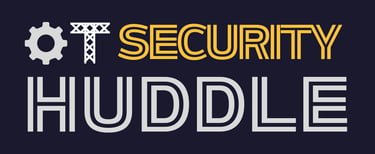ICS Security Foundation
40 hrs of ICS Security Learnings


Supported by OT Security Huddle
Introduction
Our 5-day ICS Cybersecurity Course is tailored for professionals aiming to master the intricacies of industrial control systems (ICS) cybersecurity. This comprehensive program offers in-depth knowledge of ICS architecture, threat landscapes, and advanced security practices, reinforced through hands-on virtual labs. Ideal for those responsible for securing critical infrastructure, this course also prepares participants for relevant certifications in the ICS cybersecurity domain.
Bonus:
Get all the learning for appearing for GICSP Certification Exam
2 GICSP level Practice Exams
Duration: 5 Days (40 Hours)
Delivery Method: Virtual
Next Batch: October 18-19, Nov 1-2,8, 2025
Price: USD 999 899 or INR 74,999 59,999
Day 1: Foundations of Industrial Control Systems (ICS) and Cyber-Physical Operations
Hours: 8
Topics Covered:
Introduction to Industrial Control Systems (ICS):
Overview of ICS environments and key industries (DCS, SCADA, PLCs).
Key components and processes within ICS.
ICS Architecture:
Deep dive into ICS architecture (Purdue Model Levels 0-3).
Controllers, field devices, HMIs, historians, and specialized applications.
Cyber-Physical Considerations:
Understanding the interplay between cyber and physical systems.
Importance of safety protections and communication needs in ICS.
Virtual Exercises:
Simulated PLC Programming: Use online PLC simulators to practice programming and mapping to HMI.
ICS Component Mapping: Virtual exercise to identify and categorize ICS components within a sample network.
ICS Terminology Quiz: Online quiz to reinforce understanding of key ICS terms.
Day 2: ICS Threat Landscape and Defensive Architecture Design
Hours: 8
Topics Covered:
Threats and Vulnerabilities in ICS:
Overview of the threat landscape specific to ICS.
Common vulnerabilities in ICS environments.
Real-world case studies of ICS security incidents.
Designing Secure ICS Architectures:
Best practices for designing secure ICS networks.
Securing remote access and ensuring defensible architectures.
Virtual Exercises:
Identifying Attack Surfaces: Use case studies to virtually map potential attack surfaces in an ICS setup.
Architecting Secure Sites: Collaborative online design of a secure ICS site using real-world scenarios.
Modbus Protocol Analysis: Capture and analyze Modbus protocol traffic in a virtual lab environment.
Day 3: Secure Communication Protocols and Network Defense in ICS
Hours: 8
Topics Covered:
ICS Communication Protocols:
Overview of key ICS communication protocols (Modbus, DNP3).
Understanding Ethernet and TCP/IP in ICS environments.
Securing Network Traffic:
Techniques for analyzing and securing ICS network traffic.
Role of firewalls, NIDS/NIPS, and data diodes in ICS.
Virtual Exercises:
Network Capture Analysis: Use cloud-hosted Wireshark instances to analyze pre-captured ICS network traffic.
Enumerating ICS Protocols: Identify and analyze specific ICS protocols using online tools.
Firewall Configuration: Virtual configuration of firewall rules using simulation tools.
Encryption Exercise: Online exercise to implement basic encryption on ICS communications and verify integrity.
Day 4: Supervisory Control and Data Acquisition (SCADA) Systems and Attack Mitigation
Hours: 8
Topics Covered:
Supervisory Systems in ICS:
Deep dive into SCADA, HMIs, and historian systems.
Understanding the vulnerabilities and attack vectors.
Workstation and Server Security:
Securing ICS workstations and servers.
Implementing security policies and patch management.
Incident Response in ICS:
Incident detection and response strategies specific to ICS.
Practical approaches to incident containment and recovery.
Virtual Exercises:
Simulated Attacks on HMIs: Conduct simulated attacks on HMI interfaces using online labs.
Securing Windows Systems: Apply best practices in a virtual environment for securing Windows-based ICS systems.
SCADA System Hardening: Implement security measures on a virtual SCADA system.
Day 5: Governance, Compliance, and Linux Security in ICS
Hours: 8
Topics Covered:
Governance and Compliance in ICS:
Understanding key regulatory frameworks and standards.
Developing and enforcing cybersecurity policies in ICS.
Linux Systems in ICS:
Overview of Linux-based systems in ICS environments.
Techniques for hardening and securing Linux systems.
Building a Robust ICS Security Program:
Steps to establish a comprehensive ICS cybersecurity program.
Integration of risk management and disaster recovery planning.
Virtual Exercises:
Hardening Linux Systems: Apply security best practices in a cloud-based Linux environment.
Log Management: Use virtual machines to manage and analyze logs from both Windows and Linux environments.
Policy Development Workshop: Collaboratively create and review ICS security policies in an online workshop.
Disaster Recovery Plan Exercise: Develop a disaster recovery plan for a simulated ICS environment and test its effectiveness through online collaboration tools.
Additional Resources:
Study Materials:
Access to digital reading lists and study guides.
Case studies and industry reports accessible online for deeper insights.
Practice Scenarios:
Real-world scenarios and challenges delivered through virtual labs.
Post-Course Support:
Online community access for peer support and continuous learning.
Follow-up virtual sessions and resources to support ongoing professional development.
Prerequisites
Equipment: Participants must have a laptop with at least 8 GB of RAM.
Software: VirtualBox must be installed before the course begins.
Internet: Stable Internet connection
Mission
Empowering individuals to excel in cybersecurity careers through mentoring.
Write to us
info@syberwise.com
+91 8748000076
© 2024. All rights reserved.
Customer Care


Be Cyber Secure
